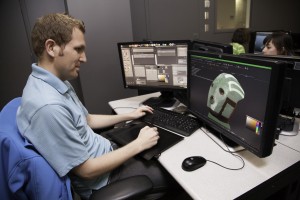College graduation inspires optimism — particularly optimistic hope for a job. However, for BYU’s animation graduates, finding a job in their field may be a little more difficult.
Over the past couple of years, the “Hollywood effect” has not been as powerful as it used to be — the industry has taken a hard hit. The big film companies that used to pay their actors millions of dollars and allow their animators to explore new ideas are now being forced to cut their budgets and downsize their companies. And the trickle-down effect has been felt at BYU.
Michael White, an entertainment reporter for Bloomberg News, explained the current situation in the animation industry during a recent BYU campus visit.
“The animation and effects businesses are under pressure, but for slightly different reasons,” White said. “DreamWorks’ animations problems have to do with the box office. They only release about two or three movies a year, so when one dies at the box office, they feel the pain very accurately.”

It’s situations like this that have led to the layoffs of 350 people at DreamWorks Animations, one of the most well-known animation studios in the world and an important job and internship provider for BYU animation students.
According to White, computer animation is no longer as unique as it used to be. Back when DreamWorks and Pixar had the field to themselves, they could cash in at the box office.
“Now Paramount, Universal, Sony and Fox all make animated films and do it reasonably well,” White said. “Technological dazzles are no longer a surprise for audiences, and this makes it tougher for any one film to stand out.”
Steve Hulett, a business representative for the Animation Guild, a labor organization that represents animation and visual effects artists, described the animation scene in Hollywood as “under turmoil.”
This turmoil, in turn, has an impact on recent graduates—and their job opportunities.
“The industry slowdowns always impact graduates because when work is slow, they are competing against industry veterans for studio jobs and have a disadvantage,” Hulett said. “When the work is going full tilt and the industry is booming, it’s easier for newbies to get in.”
The animation industry is a field with lots of ups and downs, and Hulett is no stranger to these conditions.
“My dad worked at Disney in the 1950s, and the animation department went through a large downsizing after ‘Sleeping Beauty’ was done,” Hulett said. “The up and down of the business has happened over and over. It was just coming out of the dumps in 1989, it went into another swoon at the turn of the century, and now it seems to be going through yet another down.”
Parris Egbert, department chair of the BYU Computer Science Department, echoed Hulett’s perspective that the industry downturn has translated into fewer job opportunities for students.
“Jobs and internships are a little tougher this year than in past years,” Egbert said. “The entertainment industry as a whole has seen a downturn, and this has resulted in fewer jobs. With the reputation the animation program has at BYU, companies are still interested in our students, but it has tightened up some. We still have students doing internships, although these are harder to come by now than they used to be.”
Meredith Moulton, a senior majoring in animation from Gaithersburg, Md., is worried about the job situation in the industry but is hopeful that things will improve.
“I’m graduating next week, and it has been extremely hard to find a place to work in; I’m still trying to find a job,” Moulton said. “I don’t think the industry is dying, though. It’s in a strange place right now. People will always like animated movies, so I think once there’s another huge hit things will get easier, but until then it’s crazy.”
Garrett Hoyos, an animation major from Topeka, Kan., is also positive that graduating students in the animation programs will find jobs after graduation.
“I don’t think we are at all negative in the program. It’s a little scary for graduating seniors, but I have no doubt those who deserve jobs will go somewhere, even if it’s not at one of the big studios,” Hoyos said. “I think anyone can get a job who really fights for it.”




